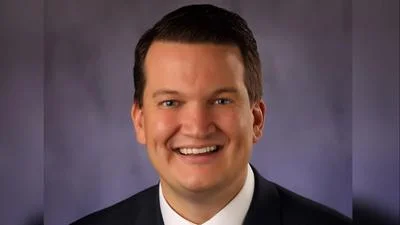State Sen. Win Stoller | Facebook / Win Stoller
State Sen. Win Stoller | Facebook / Win Stoller
A bill that creates a siting requirement for wind and solar facilities was signed last week despite a letter to Gov Pritzker from Sen. Win Stoller (R-Peoria) urging him to consider vetoing the bill.
“Earlier this week, I sent a letter to the Governor requesting that he either veto, or at the very least, amendatory veto House Bill 4412,” Stoller wrote in a post on Facebook. “This bill will completely destroy local control when it comes to zoning for wind and solar farms. It also has the potential to be devastating to local economic growth plans throughout the entire state.”
According to the Illinois General Assembly website, House Bill 4412 was signed on Jan. 27. It was originally filed by Rep. Kathleen Willis (R-Lakeshore) on Jan. 7, 2022.
NPR reported that the bill creates a setback requirement for blade heights, as well as requiring 30 hours or less shadow flicker (shadows caused by the turning blades) per year for community buildings and nonparticipating residences.
Stoller’s post included the letter that he sent to the governor which said, “I am writing to urge you to consider vetoing, or at the very least, issuing and amendatory veto to House Bill 4412, which is legislation that passed during the Lame Duck session and would create a statewide siting standard for wind and solar energy facilities.”
The letter went on to say, “As the legislation is written, current areas deemed as 'Enterprise Zones' were not carved out or exempted. As you know, these zones are thoughtfully created to encourage economic growth and development. Under House Bill 4412, renewable projects could still be placed in these zones if the new standards are met. This has created great confusion for economic development officials and community leaders who have spent years and millions of dollars developing these Enterprise Zones.”
According to Farmweek Now, the Illinois Farm Bureau is in opposition to the bill, citing the absence of required enforcement by the Illinois Department of Agriculture to implement Agricultural Impact Mitigation Agreements. It was also concerned that there is no requirement to develop and implement a drainage plan to address water resulting from rainfall.
“Despite IFB policy supporting statewide standards for commercial wind energy and commercial solar energy standards, IFB told legislators the bill as proposed did not adequately protect private property and build an acceptable minimum standard for development of wind and solar facilities,” IFB Director of State Legislation Kevin Semlow said in the release on the bureau’s website.




 Alerts Sign-up
Alerts Sign-up